Psychology in Health and Social Care: Detailed Report Analysis
VerifiedAdded on 2020/10/22
|13
|3948
|216
Report
AI Summary
This report delves into the application of psychology within health and social care settings. It begins by comparing various psychological theories of lifespan development, including Erikson's stages of psychosocial development and Freud's psychosexual stages, and then explores how these theories relate to specific life stages. The report then examines the influence of both social and biological factors on human behavior and analyzes the importance of social roles within health and social care environments. Furthermore, it analyzes how psychological theories inform the understanding of behavior disturbance and mental health disorders, as well as how psychological principles can be applied to effect behavior change. Finally, it explores how psychological theories can enhance the understanding of relationships in health and social care. The report concludes with an overview of the key findings and their implications for practice.
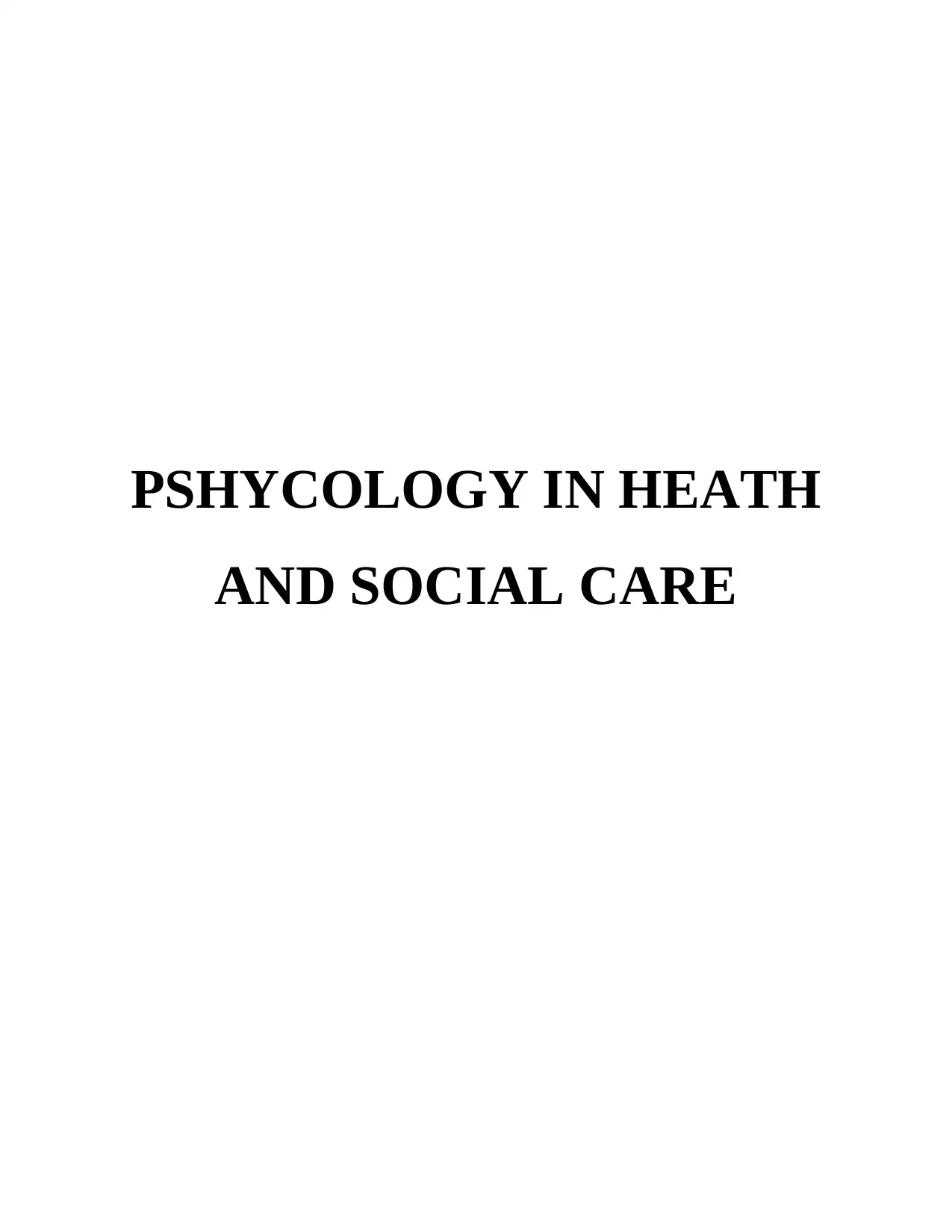
PSHYCOLOGY IN HEATH
AND SOCIAL CARE
AND SOCIAL CARE
Paraphrase This Document
Need a fresh take? Get an instant paraphrase of this document with our AI Paraphraser
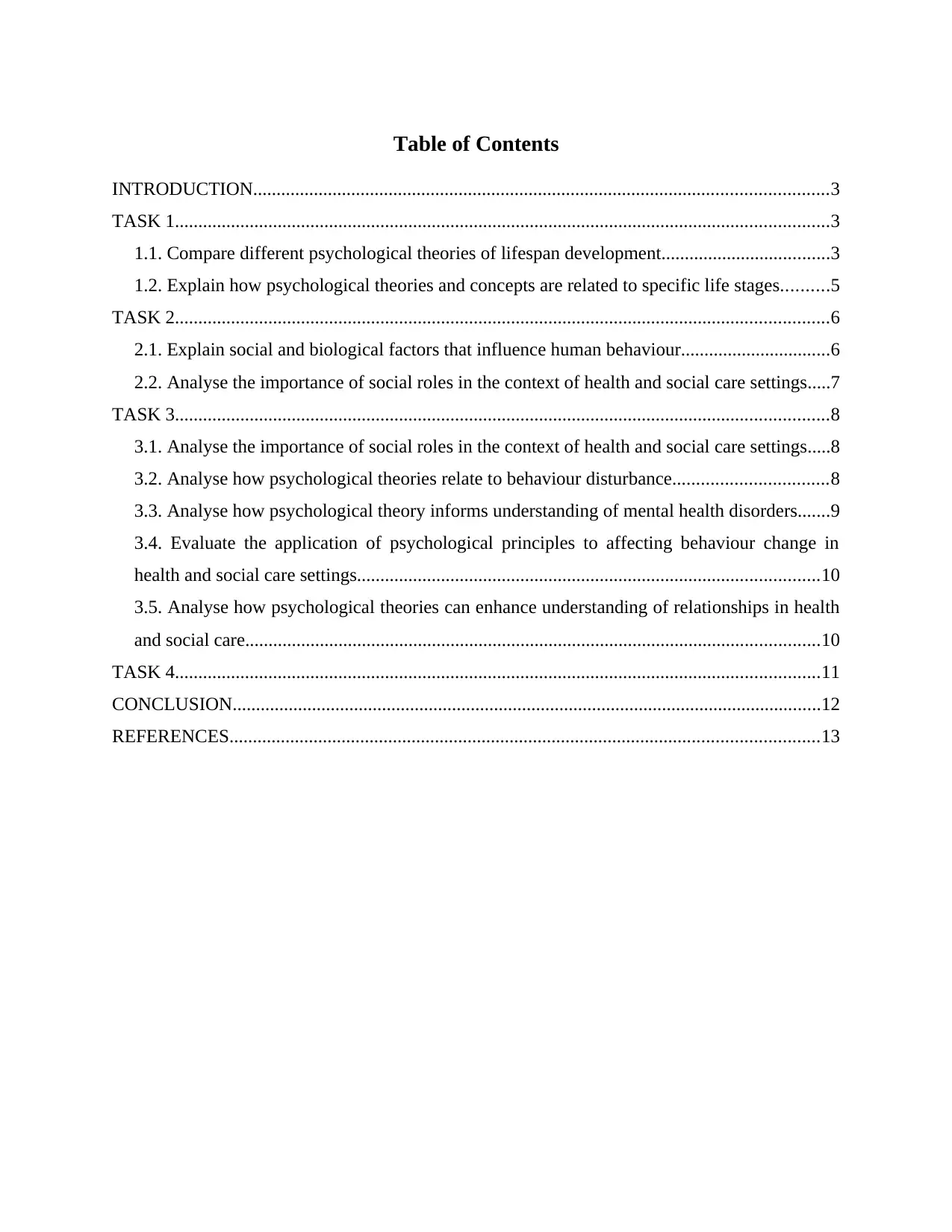
Table of Contents
INTRODUCTION...........................................................................................................................3
TASK 1............................................................................................................................................3
1.1. Compare different psychological theories of lifespan development....................................3
1.2. Explain how psychological theories and concepts are related to specific life stages..........5
TASK 2............................................................................................................................................6
2.1. Explain social and biological factors that influence human behaviour................................6
2.2. Analyse the importance of social roles in the context of health and social care settings.....7
TASK 3............................................................................................................................................8
3.1. Analyse the importance of social roles in the context of health and social care settings.....8
3.2. Analyse how psychological theories relate to behaviour disturbance.................................8
3.3. Analyse how psychological theory informs understanding of mental health disorders.......9
3.4. Evaluate the application of psychological principles to affecting behaviour change in
health and social care settings...................................................................................................10
3.5. Analyse how psychological theories can enhance understanding of relationships in health
and social care...........................................................................................................................10
TASK 4..........................................................................................................................................11
CONCLUSION..............................................................................................................................12
REFERENCES..............................................................................................................................13
INTRODUCTION...........................................................................................................................3
TASK 1............................................................................................................................................3
1.1. Compare different psychological theories of lifespan development....................................3
1.2. Explain how psychological theories and concepts are related to specific life stages..........5
TASK 2............................................................................................................................................6
2.1. Explain social and biological factors that influence human behaviour................................6
2.2. Analyse the importance of social roles in the context of health and social care settings.....7
TASK 3............................................................................................................................................8
3.1. Analyse the importance of social roles in the context of health and social care settings.....8
3.2. Analyse how psychological theories relate to behaviour disturbance.................................8
3.3. Analyse how psychological theory informs understanding of mental health disorders.......9
3.4. Evaluate the application of psychological principles to affecting behaviour change in
health and social care settings...................................................................................................10
3.5. Analyse how psychological theories can enhance understanding of relationships in health
and social care...........................................................................................................................10
TASK 4..........................................................................................................................................11
CONCLUSION..............................................................................................................................12
REFERENCES..............................................................................................................................13
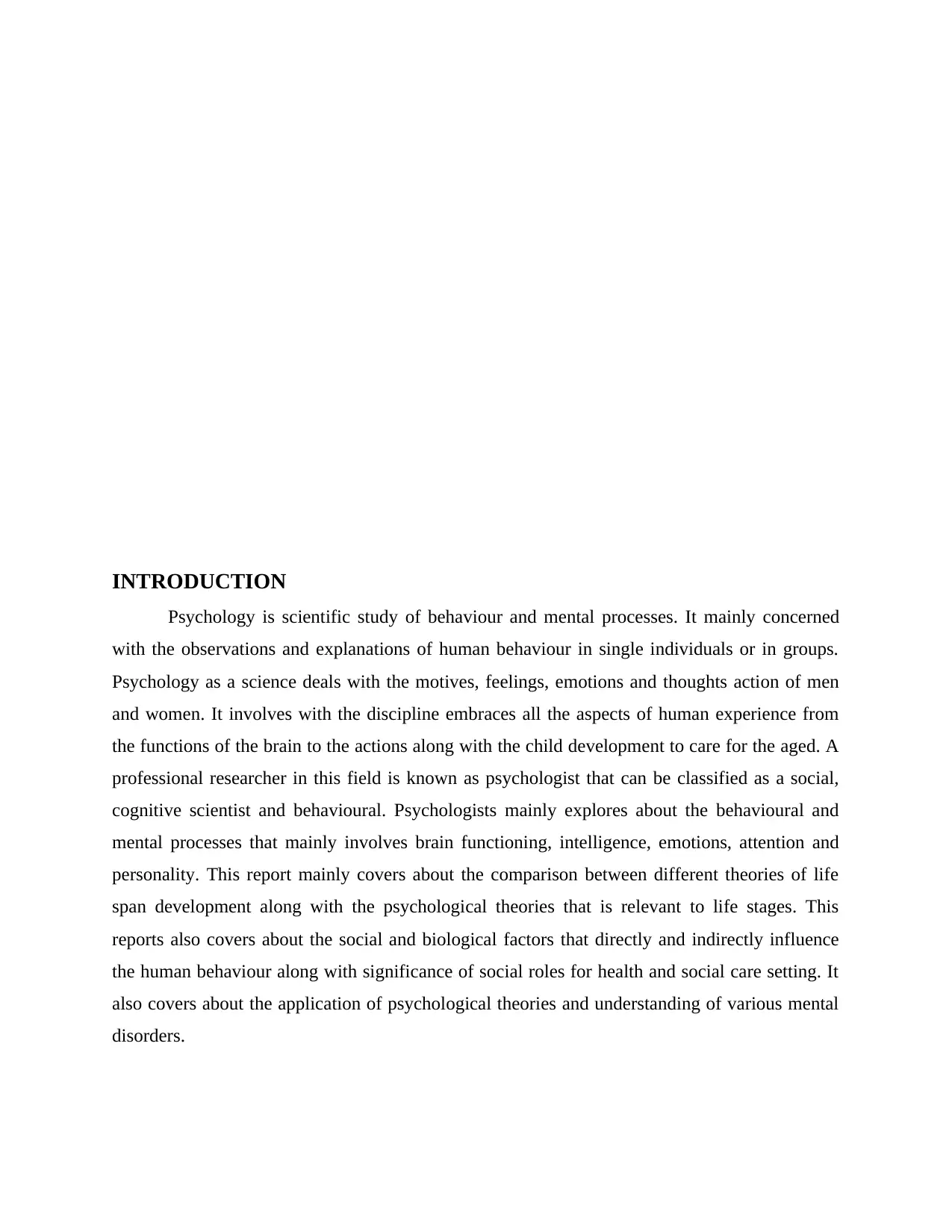
INTRODUCTION
Psychology is scientific study of behaviour and mental processes. It mainly concerned
with the observations and explanations of human behaviour in single individuals or in groups.
Psychology as a science deals with the motives, feelings, emotions and thoughts action of men
and women. It involves with the discipline embraces all the aspects of human experience from
the functions of the brain to the actions along with the child development to care for the aged. A
professional researcher in this field is known as psychologist that can be classified as a social,
cognitive scientist and behavioural. Psychologists mainly explores about the behavioural and
mental processes that mainly involves brain functioning, intelligence, emotions, attention and
personality. This report mainly covers about the comparison between different theories of life
span development along with the psychological theories that is relevant to life stages. This
reports also covers about the social and biological factors that directly and indirectly influence
the human behaviour along with significance of social roles for health and social care setting. It
also covers about the application of psychological theories and understanding of various mental
disorders.
Psychology is scientific study of behaviour and mental processes. It mainly concerned
with the observations and explanations of human behaviour in single individuals or in groups.
Psychology as a science deals with the motives, feelings, emotions and thoughts action of men
and women. It involves with the discipline embraces all the aspects of human experience from
the functions of the brain to the actions along with the child development to care for the aged. A
professional researcher in this field is known as psychologist that can be classified as a social,
cognitive scientist and behavioural. Psychologists mainly explores about the behavioural and
mental processes that mainly involves brain functioning, intelligence, emotions, attention and
personality. This report mainly covers about the comparison between different theories of life
span development along with the psychological theories that is relevant to life stages. This
reports also covers about the social and biological factors that directly and indirectly influence
the human behaviour along with significance of social roles for health and social care setting. It
also covers about the application of psychological theories and understanding of various mental
disorders.
⊘ This is a preview!⊘
Do you want full access?
Subscribe today to unlock all pages.

Trusted by 1+ million students worldwide
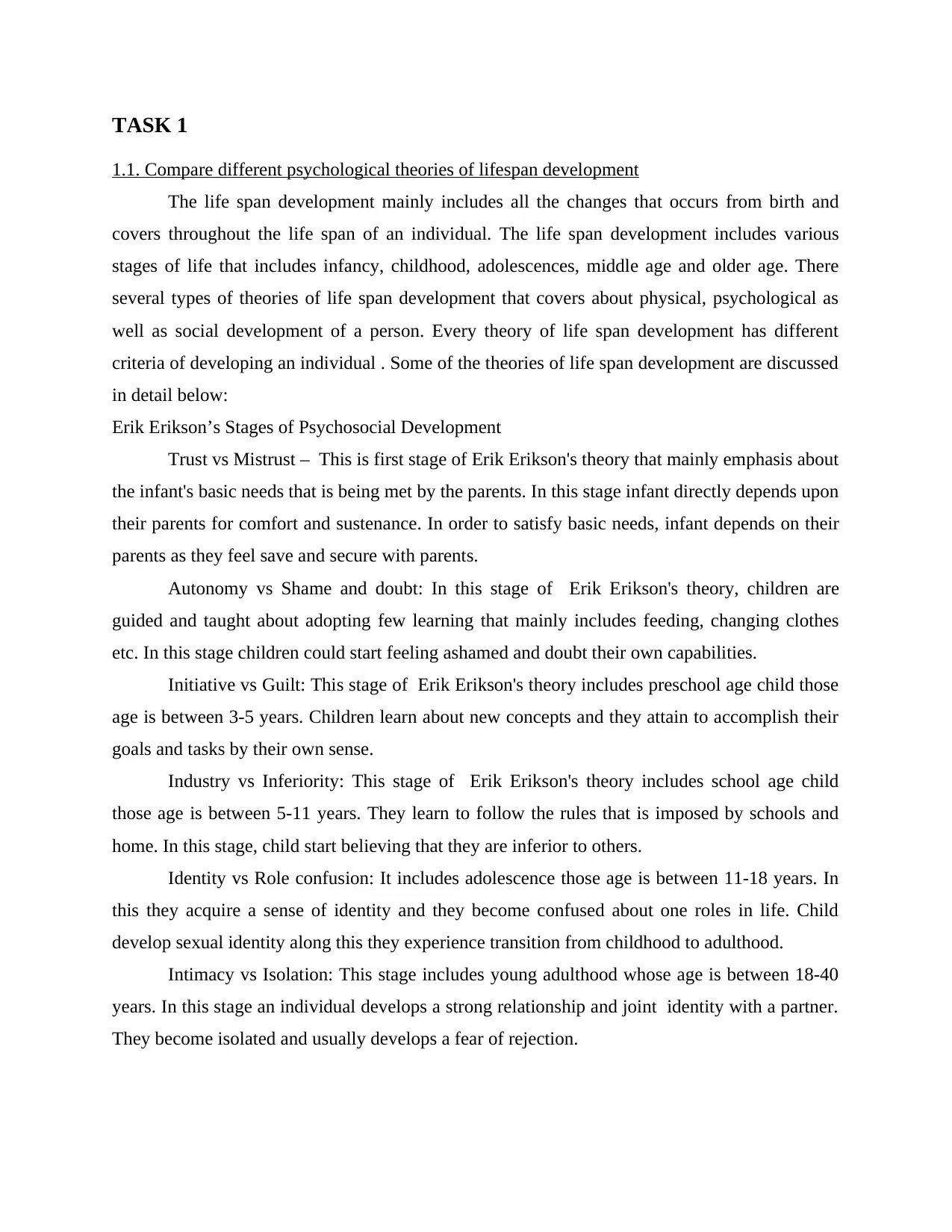
TASK 1
1.1. Compare different psychological theories of lifespan development
The life span development mainly includes all the changes that occurs from birth and
covers throughout the life span of an individual. The life span development includes various
stages of life that includes infancy, childhood, adolescences, middle age and older age. There
several types of theories of life span development that covers about physical, psychological as
well as social development of a person. Every theory of life span development has different
criteria of developing an individual . Some of the theories of life span development are discussed
in detail below:
Erik Erikson’s Stages of Psychosocial Development
Trust vs Mistrust – This is first stage of Erik Erikson's theory that mainly emphasis about
the infant's basic needs that is being met by the parents. In this stage infant directly depends upon
their parents for comfort and sustenance. In order to satisfy basic needs, infant depends on their
parents as they feel save and secure with parents.
Autonomy vs Shame and doubt: In this stage of Erik Erikson's theory, children are
guided and taught about adopting few learning that mainly includes feeding, changing clothes
etc. In this stage children could start feeling ashamed and doubt their own capabilities.
Initiative vs Guilt: This stage of Erik Erikson's theory includes preschool age child those
age is between 3-5 years. Children learn about new concepts and they attain to accomplish their
goals and tasks by their own sense.
Industry vs Inferiority: This stage of Erik Erikson's theory includes school age child
those age is between 5-11 years. They learn to follow the rules that is imposed by schools and
home. In this stage, child start believing that they are inferior to others.
Identity vs Role confusion: It includes adolescence those age is between 11-18 years. In
this they acquire a sense of identity and they become confused about one roles in life. Child
develop sexual identity along this they experience transition from childhood to adulthood.
Intimacy vs Isolation: This stage includes young adulthood whose age is between 18-40
years. In this stage an individual develops a strong relationship and joint identity with a partner.
They become isolated and usually develops a fear of rejection.
1.1. Compare different psychological theories of lifespan development
The life span development mainly includes all the changes that occurs from birth and
covers throughout the life span of an individual. The life span development includes various
stages of life that includes infancy, childhood, adolescences, middle age and older age. There
several types of theories of life span development that covers about physical, psychological as
well as social development of a person. Every theory of life span development has different
criteria of developing an individual . Some of the theories of life span development are discussed
in detail below:
Erik Erikson’s Stages of Psychosocial Development
Trust vs Mistrust – This is first stage of Erik Erikson's theory that mainly emphasis about
the infant's basic needs that is being met by the parents. In this stage infant directly depends upon
their parents for comfort and sustenance. In order to satisfy basic needs, infant depends on their
parents as they feel save and secure with parents.
Autonomy vs Shame and doubt: In this stage of Erik Erikson's theory, children are
guided and taught about adopting few learning that mainly includes feeding, changing clothes
etc. In this stage children could start feeling ashamed and doubt their own capabilities.
Initiative vs Guilt: This stage of Erik Erikson's theory includes preschool age child those
age is between 3-5 years. Children learn about new concepts and they attain to accomplish their
goals and tasks by their own sense.
Industry vs Inferiority: This stage of Erik Erikson's theory includes school age child
those age is between 5-11 years. They learn to follow the rules that is imposed by schools and
home. In this stage, child start believing that they are inferior to others.
Identity vs Role confusion: It includes adolescence those age is between 11-18 years. In
this they acquire a sense of identity and they become confused about one roles in life. Child
develop sexual identity along this they experience transition from childhood to adulthood.
Intimacy vs Isolation: This stage includes young adulthood whose age is between 18-40
years. In this stage an individual develops a strong relationship and joint identity with a partner.
They become isolated and usually develops a fear of rejection.
Paraphrase This Document
Need a fresh take? Get an instant paraphrase of this document with our AI Paraphraser
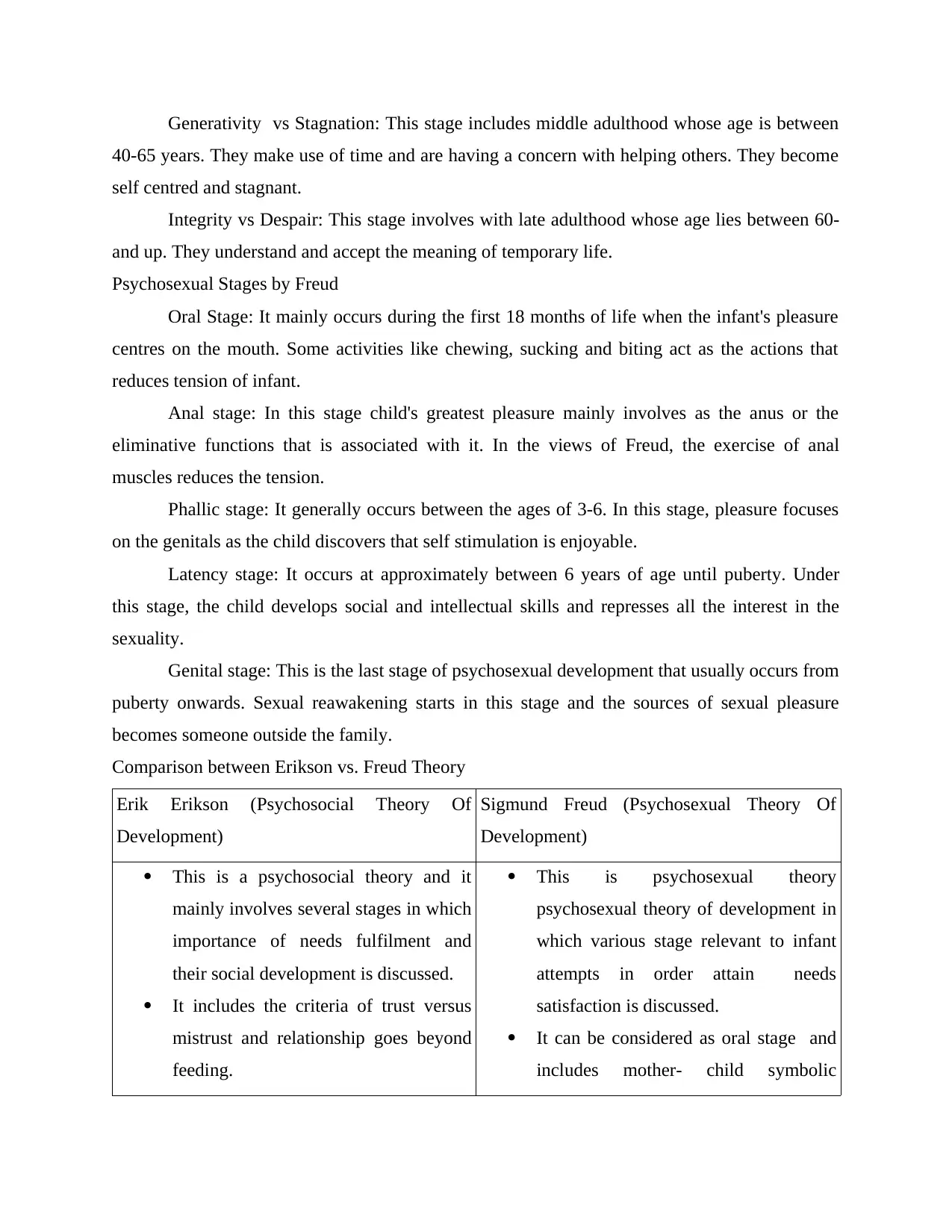
Generativity vs Stagnation: This stage includes middle adulthood whose age is between
40-65 years. They make use of time and are having a concern with helping others. They become
self centred and stagnant.
Integrity vs Despair: This stage involves with late adulthood whose age lies between 60-
and up. They understand and accept the meaning of temporary life.
Psychosexual Stages by Freud
Oral Stage: It mainly occurs during the first 18 months of life when the infant's pleasure
centres on the mouth. Some activities like chewing, sucking and biting act as the actions that
reduces tension of infant.
Anal stage: In this stage child's greatest pleasure mainly involves as the anus or the
eliminative functions that is associated with it. In the views of Freud, the exercise of anal
muscles reduces the tension.
Phallic stage: It generally occurs between the ages of 3-6. In this stage, pleasure focuses
on the genitals as the child discovers that self stimulation is enjoyable.
Latency stage: It occurs at approximately between 6 years of age until puberty. Under
this stage, the child develops social and intellectual skills and represses all the interest in the
sexuality.
Genital stage: This is the last stage of psychosexual development that usually occurs from
puberty onwards. Sexual reawakening starts in this stage and the sources of sexual pleasure
becomes someone outside the family.
Comparison between Erikson vs. Freud Theory
Erik Erikson (Psychosocial Theory Of
Development)
Sigmund Freud (Psychosexual Theory Of
Development)
This is a psychosocial theory and it
mainly involves several stages in which
importance of needs fulfilment and
their social development is discussed.
It includes the criteria of trust versus
mistrust and relationship goes beyond
feeding.
This is psychosexual theory
psychosexual theory of development in
which various stage relevant to infant
attempts in order attain needs
satisfaction is discussed.
It can be considered as oral stage and
includes mother- child symbolic
40-65 years. They make use of time and are having a concern with helping others. They become
self centred and stagnant.
Integrity vs Despair: This stage involves with late adulthood whose age lies between 60-
and up. They understand and accept the meaning of temporary life.
Psychosexual Stages by Freud
Oral Stage: It mainly occurs during the first 18 months of life when the infant's pleasure
centres on the mouth. Some activities like chewing, sucking and biting act as the actions that
reduces tension of infant.
Anal stage: In this stage child's greatest pleasure mainly involves as the anus or the
eliminative functions that is associated with it. In the views of Freud, the exercise of anal
muscles reduces the tension.
Phallic stage: It generally occurs between the ages of 3-6. In this stage, pleasure focuses
on the genitals as the child discovers that self stimulation is enjoyable.
Latency stage: It occurs at approximately between 6 years of age until puberty. Under
this stage, the child develops social and intellectual skills and represses all the interest in the
sexuality.
Genital stage: This is the last stage of psychosexual development that usually occurs from
puberty onwards. Sexual reawakening starts in this stage and the sources of sexual pleasure
becomes someone outside the family.
Comparison between Erikson vs. Freud Theory
Erik Erikson (Psychosocial Theory Of
Development)
Sigmund Freud (Psychosexual Theory Of
Development)
This is a psychosocial theory and it
mainly involves several stages in which
importance of needs fulfilment and
their social development is discussed.
It includes the criteria of trust versus
mistrust and relationship goes beyond
feeding.
This is psychosexual theory
psychosexual theory of development in
which various stage relevant to infant
attempts in order attain needs
satisfaction is discussed.
It can be considered as oral stage and
includes mother- child symbolic
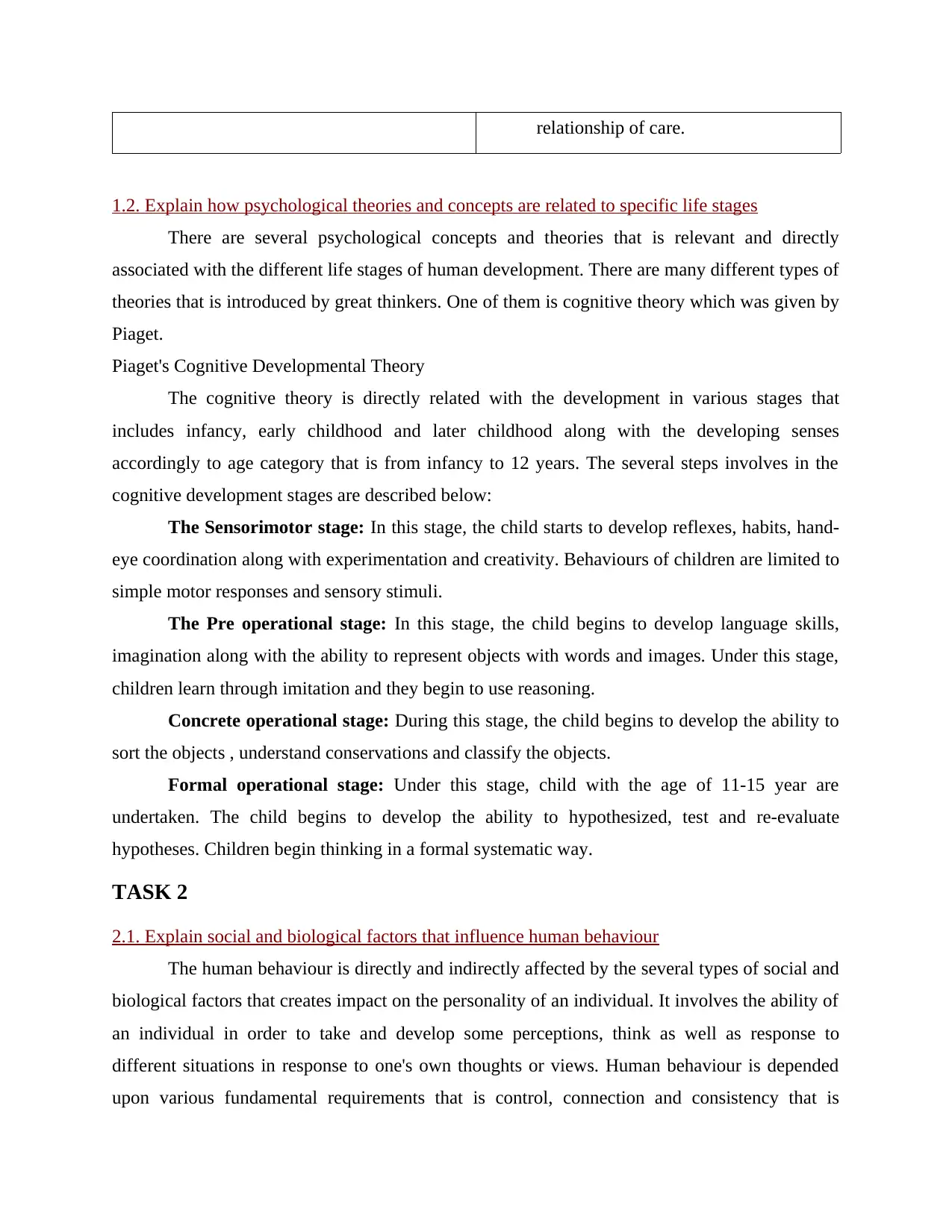
relationship of care.
1.2. Explain how psychological theories and concepts are related to specific life stages
There are several psychological concepts and theories that is relevant and directly
associated with the different life stages of human development. There are many different types of
theories that is introduced by great thinkers. One of them is cognitive theory which was given by
Piaget.
Piaget's Cognitive Developmental Theory
The cognitive theory is directly related with the development in various stages that
includes infancy, early childhood and later childhood along with the developing senses
accordingly to age category that is from infancy to 12 years. The several steps involves in the
cognitive development stages are described below:
The Sensorimotor stage: In this stage, the child starts to develop reflexes, habits, hand-
eye coordination along with experimentation and creativity. Behaviours of children are limited to
simple motor responses and sensory stimuli.
The Pre operational stage: In this stage, the child begins to develop language skills,
imagination along with the ability to represent objects with words and images. Under this stage,
children learn through imitation and they begin to use reasoning.
Concrete operational stage: During this stage, the child begins to develop the ability to
sort the objects , understand conservations and classify the objects.
Formal operational stage: Under this stage, child with the age of 11-15 year are
undertaken. The child begins to develop the ability to hypothesized, test and re-evaluate
hypotheses. Children begin thinking in a formal systematic way.
TASK 2
2.1. Explain social and biological factors that influence human behaviour
The human behaviour is directly and indirectly affected by the several types of social and
biological factors that creates impact on the personality of an individual. It involves the ability of
an individual in order to take and develop some perceptions, think as well as response to
different situations in response to one's own thoughts or views. Human behaviour is depended
upon various fundamental requirements that is control, connection and consistency that is
1.2. Explain how psychological theories and concepts are related to specific life stages
There are several psychological concepts and theories that is relevant and directly
associated with the different life stages of human development. There are many different types of
theories that is introduced by great thinkers. One of them is cognitive theory which was given by
Piaget.
Piaget's Cognitive Developmental Theory
The cognitive theory is directly related with the development in various stages that
includes infancy, early childhood and later childhood along with the developing senses
accordingly to age category that is from infancy to 12 years. The several steps involves in the
cognitive development stages are described below:
The Sensorimotor stage: In this stage, the child starts to develop reflexes, habits, hand-
eye coordination along with experimentation and creativity. Behaviours of children are limited to
simple motor responses and sensory stimuli.
The Pre operational stage: In this stage, the child begins to develop language skills,
imagination along with the ability to represent objects with words and images. Under this stage,
children learn through imitation and they begin to use reasoning.
Concrete operational stage: During this stage, the child begins to develop the ability to
sort the objects , understand conservations and classify the objects.
Formal operational stage: Under this stage, child with the age of 11-15 year are
undertaken. The child begins to develop the ability to hypothesized, test and re-evaluate
hypotheses. Children begin thinking in a formal systematic way.
TASK 2
2.1. Explain social and biological factors that influence human behaviour
The human behaviour is directly and indirectly affected by the several types of social and
biological factors that creates impact on the personality of an individual. It involves the ability of
an individual in order to take and develop some perceptions, think as well as response to
different situations in response to one's own thoughts or views. Human behaviour is depended
upon various fundamental requirements that is control, connection and consistency that is
⊘ This is a preview!⊘
Do you want full access?
Subscribe today to unlock all pages.

Trusted by 1+ million students worldwide
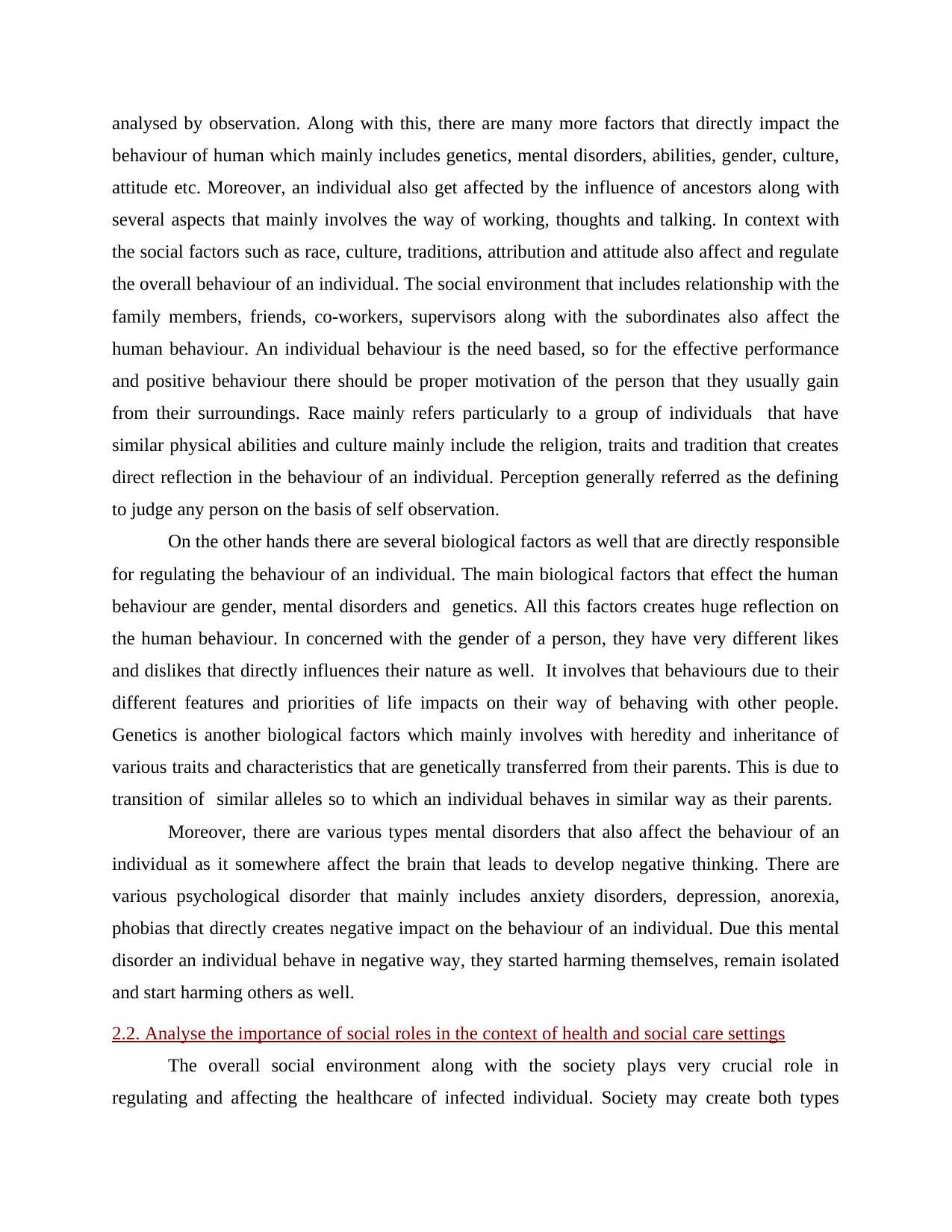
analysed by observation. Along with this, there are many more factors that directly impact the
behaviour of human which mainly includes genetics, mental disorders, abilities, gender, culture,
attitude etc. Moreover, an individual also get affected by the influence of ancestors along with
several aspects that mainly involves the way of working, thoughts and talking. In context with
the social factors such as race, culture, traditions, attribution and attitude also affect and regulate
the overall behaviour of an individual. The social environment that includes relationship with the
family members, friends, co-workers, supervisors along with the subordinates also affect the
human behaviour. An individual behaviour is the need based, so for the effective performance
and positive behaviour there should be proper motivation of the person that they usually gain
from their surroundings. Race mainly refers particularly to a group of individuals that have
similar physical abilities and culture mainly include the religion, traits and tradition that creates
direct reflection in the behaviour of an individual. Perception generally referred as the defining
to judge any person on the basis of self observation.
On the other hands there are several biological factors as well that are directly responsible
for regulating the behaviour of an individual. The main biological factors that effect the human
behaviour are gender, mental disorders and genetics. All this factors creates huge reflection on
the human behaviour. In concerned with the gender of a person, they have very different likes
and dislikes that directly influences their nature as well. It involves that behaviours due to their
different features and priorities of life impacts on their way of behaving with other people.
Genetics is another biological factors which mainly involves with heredity and inheritance of
various traits and characteristics that are genetically transferred from their parents. This is due to
transition of similar alleles so to which an individual behaves in similar way as their parents.
Moreover, there are various types mental disorders that also affect the behaviour of an
individual as it somewhere affect the brain that leads to develop negative thinking. There are
various psychological disorder that mainly includes anxiety disorders, depression, anorexia,
phobias that directly creates negative impact on the behaviour of an individual. Due this mental
disorder an individual behave in negative way, they started harming themselves, remain isolated
and start harming others as well.
2.2. Analyse the importance of social roles in the context of health and social care settings
The overall social environment along with the society plays very crucial role in
regulating and affecting the healthcare of infected individual. Society may create both types
behaviour of human which mainly includes genetics, mental disorders, abilities, gender, culture,
attitude etc. Moreover, an individual also get affected by the influence of ancestors along with
several aspects that mainly involves the way of working, thoughts and talking. In context with
the social factors such as race, culture, traditions, attribution and attitude also affect and regulate
the overall behaviour of an individual. The social environment that includes relationship with the
family members, friends, co-workers, supervisors along with the subordinates also affect the
human behaviour. An individual behaviour is the need based, so for the effective performance
and positive behaviour there should be proper motivation of the person that they usually gain
from their surroundings. Race mainly refers particularly to a group of individuals that have
similar physical abilities and culture mainly include the religion, traits and tradition that creates
direct reflection in the behaviour of an individual. Perception generally referred as the defining
to judge any person on the basis of self observation.
On the other hands there are several biological factors as well that are directly responsible
for regulating the behaviour of an individual. The main biological factors that effect the human
behaviour are gender, mental disorders and genetics. All this factors creates huge reflection on
the human behaviour. In concerned with the gender of a person, they have very different likes
and dislikes that directly influences their nature as well. It involves that behaviours due to their
different features and priorities of life impacts on their way of behaving with other people.
Genetics is another biological factors which mainly involves with heredity and inheritance of
various traits and characteristics that are genetically transferred from their parents. This is due to
transition of similar alleles so to which an individual behaves in similar way as their parents.
Moreover, there are various types mental disorders that also affect the behaviour of an
individual as it somewhere affect the brain that leads to develop negative thinking. There are
various psychological disorder that mainly includes anxiety disorders, depression, anorexia,
phobias that directly creates negative impact on the behaviour of an individual. Due this mental
disorder an individual behave in negative way, they started harming themselves, remain isolated
and start harming others as well.
2.2. Analyse the importance of social roles in the context of health and social care settings
The overall social environment along with the society plays very crucial role in
regulating and affecting the healthcare of infected individual. Society may create both types
Paraphrase This Document
Need a fresh take? Get an instant paraphrase of this document with our AI Paraphraser
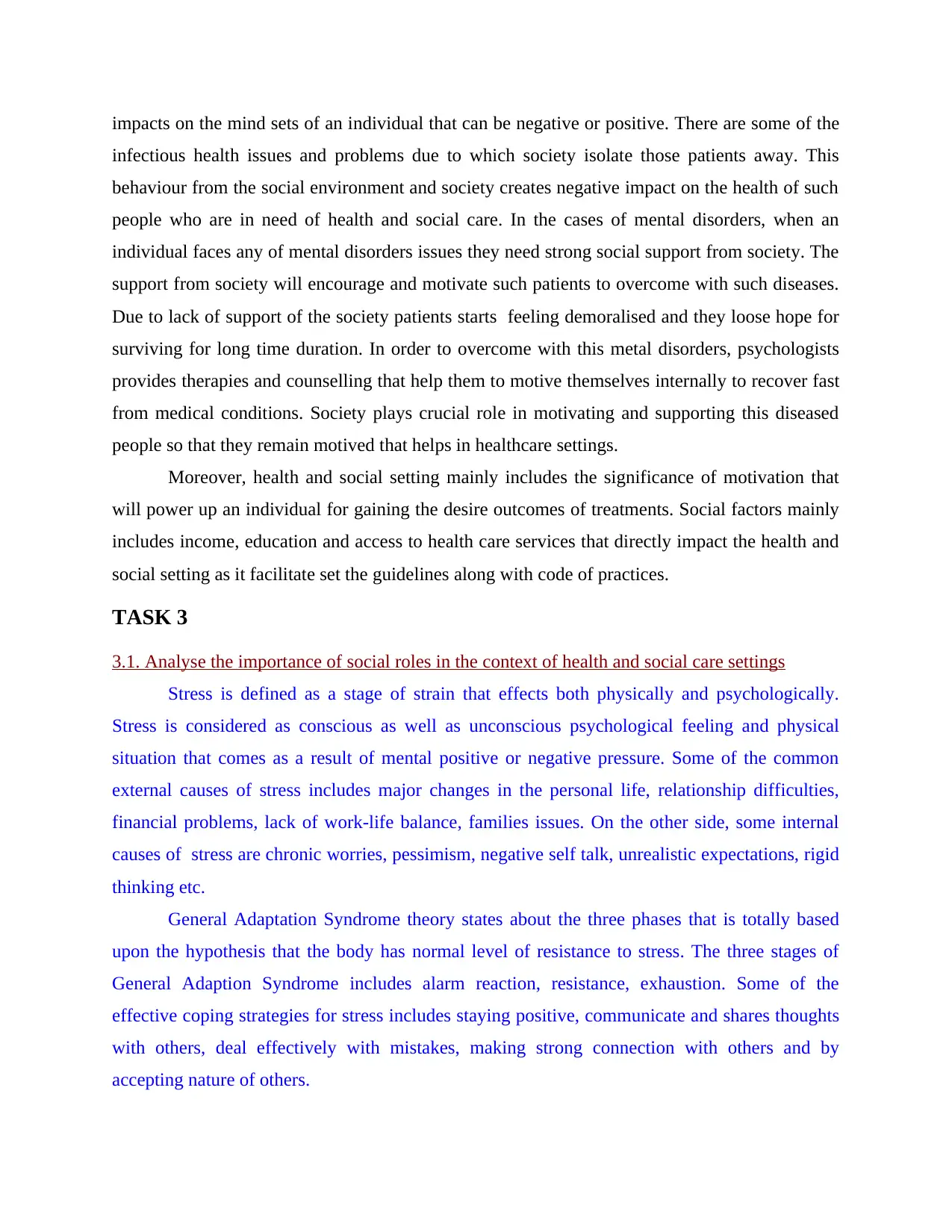
impacts on the mind sets of an individual that can be negative or positive. There are some of the
infectious health issues and problems due to which society isolate those patients away. This
behaviour from the social environment and society creates negative impact on the health of such
people who are in need of health and social care. In the cases of mental disorders, when an
individual faces any of mental disorders issues they need strong social support from society. The
support from society will encourage and motivate such patients to overcome with such diseases.
Due to lack of support of the society patients starts feeling demoralised and they loose hope for
surviving for long time duration. In order to overcome with this metal disorders, psychologists
provides therapies and counselling that help them to motive themselves internally to recover fast
from medical conditions. Society plays crucial role in motivating and supporting this diseased
people so that they remain motived that helps in healthcare settings.
Moreover, health and social setting mainly includes the significance of motivation that
will power up an individual for gaining the desire outcomes of treatments. Social factors mainly
includes income, education and access to health care services that directly impact the health and
social setting as it facilitate set the guidelines along with code of practices.
TASK 3
3.1. Analyse the importance of social roles in the context of health and social care settings
Stress is defined as a stage of strain that effects both physically and psychologically.
Stress is considered as conscious as well as unconscious psychological feeling and physical
situation that comes as a result of mental positive or negative pressure. Some of the common
external causes of stress includes major changes in the personal life, relationship difficulties,
financial problems, lack of work-life balance, families issues. On the other side, some internal
causes of stress are chronic worries, pessimism, negative self talk, unrealistic expectations, rigid
thinking etc.
General Adaptation Syndrome theory states about the three phases that is totally based
upon the hypothesis that the body has normal level of resistance to stress. The three stages of
General Adaption Syndrome includes alarm reaction, resistance, exhaustion. Some of the
effective coping strategies for stress includes staying positive, communicate and shares thoughts
with others, deal effectively with mistakes, making strong connection with others and by
accepting nature of others.
infectious health issues and problems due to which society isolate those patients away. This
behaviour from the social environment and society creates negative impact on the health of such
people who are in need of health and social care. In the cases of mental disorders, when an
individual faces any of mental disorders issues they need strong social support from society. The
support from society will encourage and motivate such patients to overcome with such diseases.
Due to lack of support of the society patients starts feeling demoralised and they loose hope for
surviving for long time duration. In order to overcome with this metal disorders, psychologists
provides therapies and counselling that help them to motive themselves internally to recover fast
from medical conditions. Society plays crucial role in motivating and supporting this diseased
people so that they remain motived that helps in healthcare settings.
Moreover, health and social setting mainly includes the significance of motivation that
will power up an individual for gaining the desire outcomes of treatments. Social factors mainly
includes income, education and access to health care services that directly impact the health and
social setting as it facilitate set the guidelines along with code of practices.
TASK 3
3.1. Analyse the importance of social roles in the context of health and social care settings
Stress is defined as a stage of strain that effects both physically and psychologically.
Stress is considered as conscious as well as unconscious psychological feeling and physical
situation that comes as a result of mental positive or negative pressure. Some of the common
external causes of stress includes major changes in the personal life, relationship difficulties,
financial problems, lack of work-life balance, families issues. On the other side, some internal
causes of stress are chronic worries, pessimism, negative self talk, unrealistic expectations, rigid
thinking etc.
General Adaptation Syndrome theory states about the three phases that is totally based
upon the hypothesis that the body has normal level of resistance to stress. The three stages of
General Adaption Syndrome includes alarm reaction, resistance, exhaustion. Some of the
effective coping strategies for stress includes staying positive, communicate and shares thoughts
with others, deal effectively with mistakes, making strong connection with others and by
accepting nature of others.
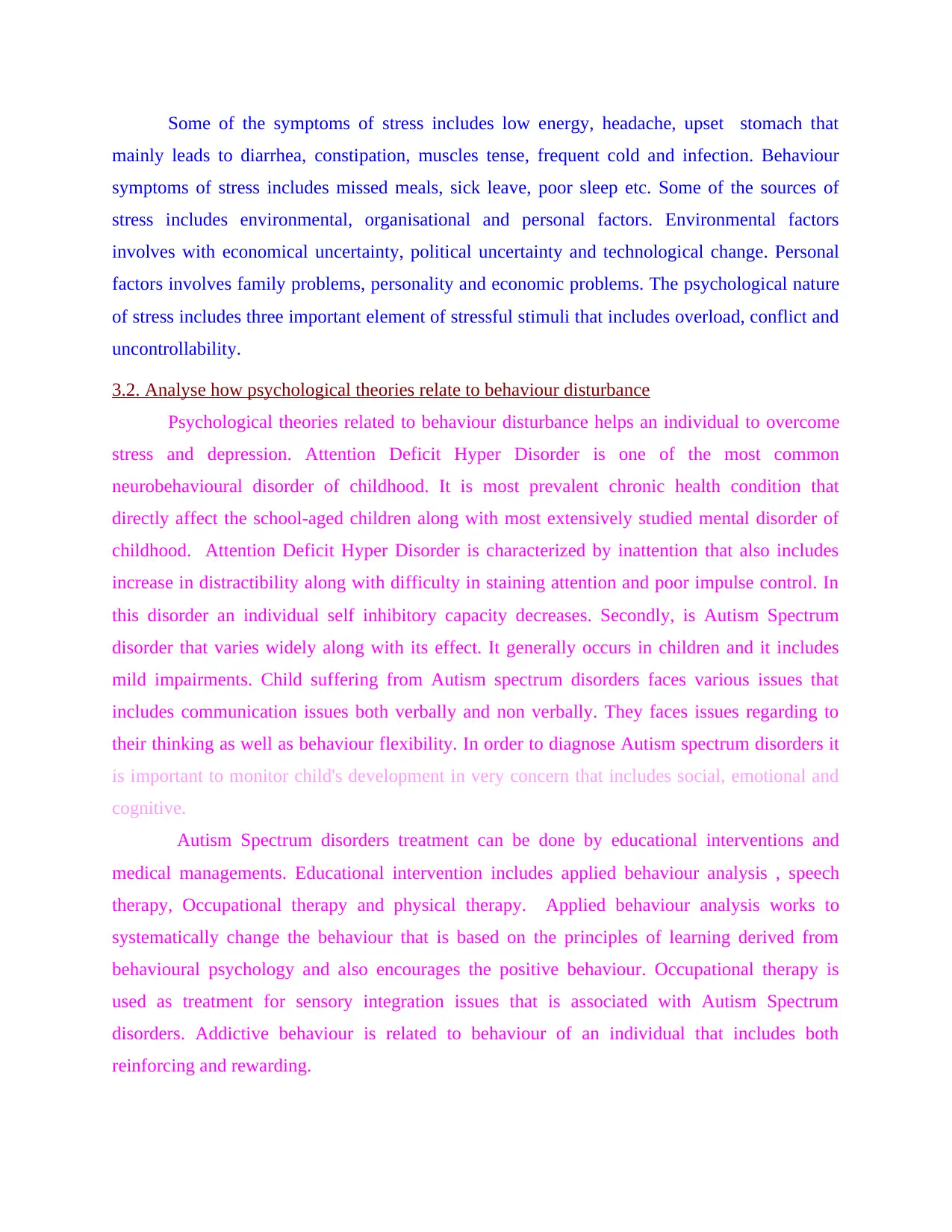
Some of the symptoms of stress includes low energy, headache, upset stomach that
mainly leads to diarrhea, constipation, muscles tense, frequent cold and infection. Behaviour
symptoms of stress includes missed meals, sick leave, poor sleep etc. Some of the sources of
stress includes environmental, organisational and personal factors. Environmental factors
involves with economical uncertainty, political uncertainty and technological change. Personal
factors involves family problems, personality and economic problems. The psychological nature
of stress includes three important element of stressful stimuli that includes overload, conflict and
uncontrollability.
3.2. Analyse how psychological theories relate to behaviour disturbance
Psychological theories related to behaviour disturbance helps an individual to overcome
stress and depression. Attention Deficit Hyper Disorder is one of the most common
neurobehavioural disorder of childhood. It is most prevalent chronic health condition that
directly affect the school-aged children along with most extensively studied mental disorder of
childhood. Attention Deficit Hyper Disorder is characterized by inattention that also includes
increase in distractibility along with difficulty in staining attention and poor impulse control. In
this disorder an individual self inhibitory capacity decreases. Secondly, is Autism Spectrum
disorder that varies widely along with its effect. It generally occurs in children and it includes
mild impairments. Child suffering from Autism spectrum disorders faces various issues that
includes communication issues both verbally and non verbally. They faces issues regarding to
their thinking as well as behaviour flexibility. In order to diagnose Autism spectrum disorders it
is important to monitor child's development in very concern that includes social, emotional and
cognitive.
Autism Spectrum disorders treatment can be done by educational interventions and
medical managements. Educational intervention includes applied behaviour analysis , speech
therapy, Occupational therapy and physical therapy. Applied behaviour analysis works to
systematically change the behaviour that is based on the principles of learning derived from
behavioural psychology and also encourages the positive behaviour. Occupational therapy is
used as treatment for sensory integration issues that is associated with Autism Spectrum
disorders. Addictive behaviour is related to behaviour of an individual that includes both
reinforcing and rewarding.
mainly leads to diarrhea, constipation, muscles tense, frequent cold and infection. Behaviour
symptoms of stress includes missed meals, sick leave, poor sleep etc. Some of the sources of
stress includes environmental, organisational and personal factors. Environmental factors
involves with economical uncertainty, political uncertainty and technological change. Personal
factors involves family problems, personality and economic problems. The psychological nature
of stress includes three important element of stressful stimuli that includes overload, conflict and
uncontrollability.
3.2. Analyse how psychological theories relate to behaviour disturbance
Psychological theories related to behaviour disturbance helps an individual to overcome
stress and depression. Attention Deficit Hyper Disorder is one of the most common
neurobehavioural disorder of childhood. It is most prevalent chronic health condition that
directly affect the school-aged children along with most extensively studied mental disorder of
childhood. Attention Deficit Hyper Disorder is characterized by inattention that also includes
increase in distractibility along with difficulty in staining attention and poor impulse control. In
this disorder an individual self inhibitory capacity decreases. Secondly, is Autism Spectrum
disorder that varies widely along with its effect. It generally occurs in children and it includes
mild impairments. Child suffering from Autism spectrum disorders faces various issues that
includes communication issues both verbally and non verbally. They faces issues regarding to
their thinking as well as behaviour flexibility. In order to diagnose Autism spectrum disorders it
is important to monitor child's development in very concern that includes social, emotional and
cognitive.
Autism Spectrum disorders treatment can be done by educational interventions and
medical managements. Educational intervention includes applied behaviour analysis , speech
therapy, Occupational therapy and physical therapy. Applied behaviour analysis works to
systematically change the behaviour that is based on the principles of learning derived from
behavioural psychology and also encourages the positive behaviour. Occupational therapy is
used as treatment for sensory integration issues that is associated with Autism Spectrum
disorders. Addictive behaviour is related to behaviour of an individual that includes both
reinforcing and rewarding.
⊘ This is a preview!⊘
Do you want full access?
Subscribe today to unlock all pages.

Trusted by 1+ million students worldwide
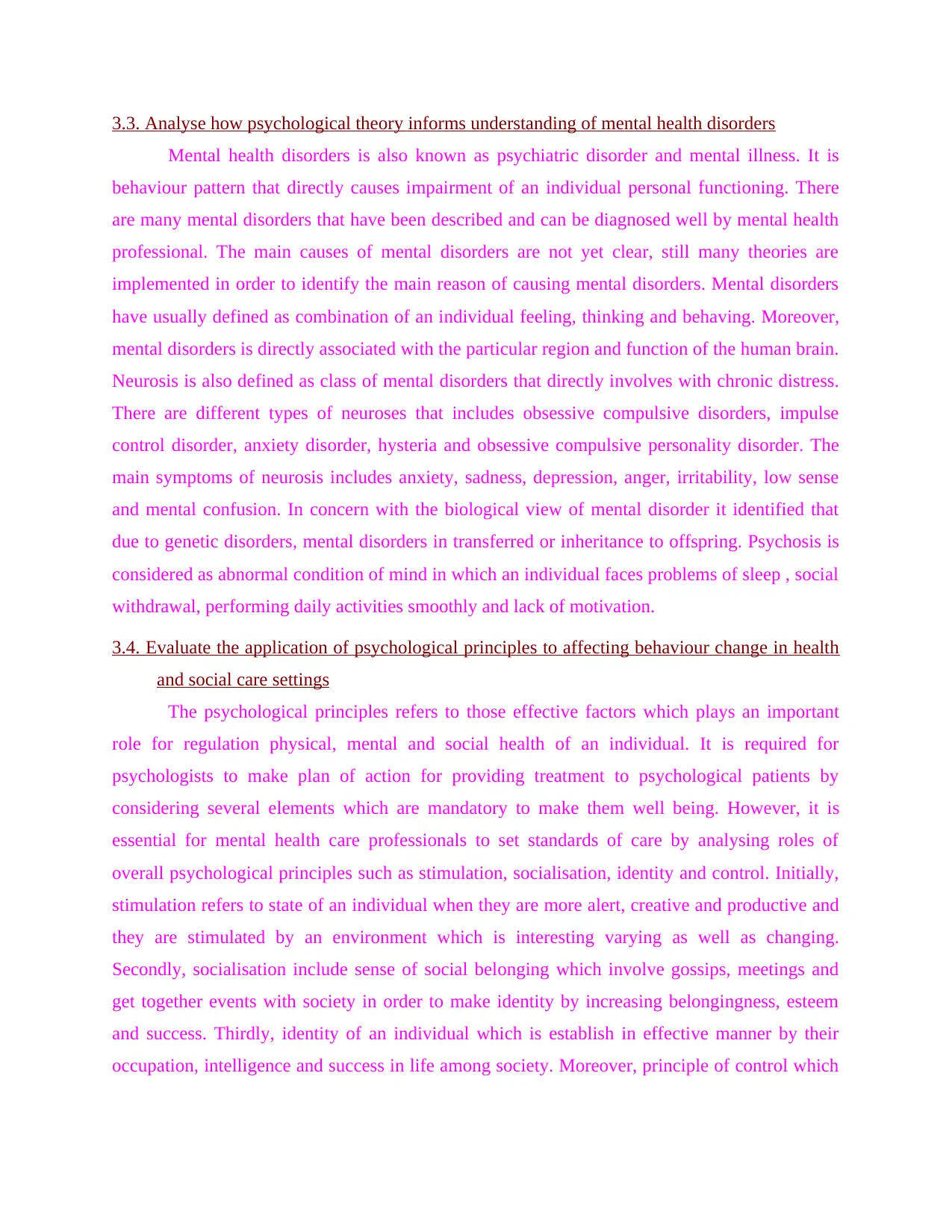
3.3. Analyse how psychological theory informs understanding of mental health disorders
Mental health disorders is also known as psychiatric disorder and mental illness. It is
behaviour pattern that directly causes impairment of an individual personal functioning. There
are many mental disorders that have been described and can be diagnosed well by mental health
professional. The main causes of mental disorders are not yet clear, still many theories are
implemented in order to identify the main reason of causing mental disorders. Mental disorders
have usually defined as combination of an individual feeling, thinking and behaving. Moreover,
mental disorders is directly associated with the particular region and function of the human brain.
Neurosis is also defined as class of mental disorders that directly involves with chronic distress.
There are different types of neuroses that includes obsessive compulsive disorders, impulse
control disorder, anxiety disorder, hysteria and obsessive compulsive personality disorder. The
main symptoms of neurosis includes anxiety, sadness, depression, anger, irritability, low sense
and mental confusion. In concern with the biological view of mental disorder it identified that
due to genetic disorders, mental disorders in transferred or inheritance to offspring. Psychosis is
considered as abnormal condition of mind in which an individual faces problems of sleep , social
withdrawal, performing daily activities smoothly and lack of motivation.
3.4. Evaluate the application of psychological principles to affecting behaviour change in health
and social care settings
The psychological principles refers to those effective factors which plays an important
role for regulation physical, mental and social health of an individual. It is required for
psychologists to make plan of action for providing treatment to psychological patients by
considering several elements which are mandatory to make them well being. However, it is
essential for mental health care professionals to set standards of care by analysing roles of
overall psychological principles such as stimulation, socialisation, identity and control. Initially,
stimulation refers to state of an individual when they are more alert, creative and productive and
they are stimulated by an environment which is interesting varying as well as changing.
Secondly, socialisation include sense of social belonging which involve gossips, meetings and
get together events with society in order to make identity by increasing belongingness, esteem
and success. Thirdly, identity of an individual which is establish in effective manner by their
occupation, intelligence and success in life among society. Moreover, principle of control which
Mental health disorders is also known as psychiatric disorder and mental illness. It is
behaviour pattern that directly causes impairment of an individual personal functioning. There
are many mental disorders that have been described and can be diagnosed well by mental health
professional. The main causes of mental disorders are not yet clear, still many theories are
implemented in order to identify the main reason of causing mental disorders. Mental disorders
have usually defined as combination of an individual feeling, thinking and behaving. Moreover,
mental disorders is directly associated with the particular region and function of the human brain.
Neurosis is also defined as class of mental disorders that directly involves with chronic distress.
There are different types of neuroses that includes obsessive compulsive disorders, impulse
control disorder, anxiety disorder, hysteria and obsessive compulsive personality disorder. The
main symptoms of neurosis includes anxiety, sadness, depression, anger, irritability, low sense
and mental confusion. In concern with the biological view of mental disorder it identified that
due to genetic disorders, mental disorders in transferred or inheritance to offspring. Psychosis is
considered as abnormal condition of mind in which an individual faces problems of sleep , social
withdrawal, performing daily activities smoothly and lack of motivation.
3.4. Evaluate the application of psychological principles to affecting behaviour change in health
and social care settings
The psychological principles refers to those effective factors which plays an important
role for regulation physical, mental and social health of an individual. It is required for
psychologists to make plan of action for providing treatment to psychological patients by
considering several elements which are mandatory to make them well being. However, it is
essential for mental health care professionals to set standards of care by analysing roles of
overall psychological principles such as stimulation, socialisation, identity and control. Initially,
stimulation refers to state of an individual when they are more alert, creative and productive and
they are stimulated by an environment which is interesting varying as well as changing.
Secondly, socialisation include sense of social belonging which involve gossips, meetings and
get together events with society in order to make identity by increasing belongingness, esteem
and success. Thirdly, identity of an individual which is establish in effective manner by their
occupation, intelligence and success in life among society. Moreover, principle of control which
Paraphrase This Document
Need a fresh take? Get an instant paraphrase of this document with our AI Paraphraser
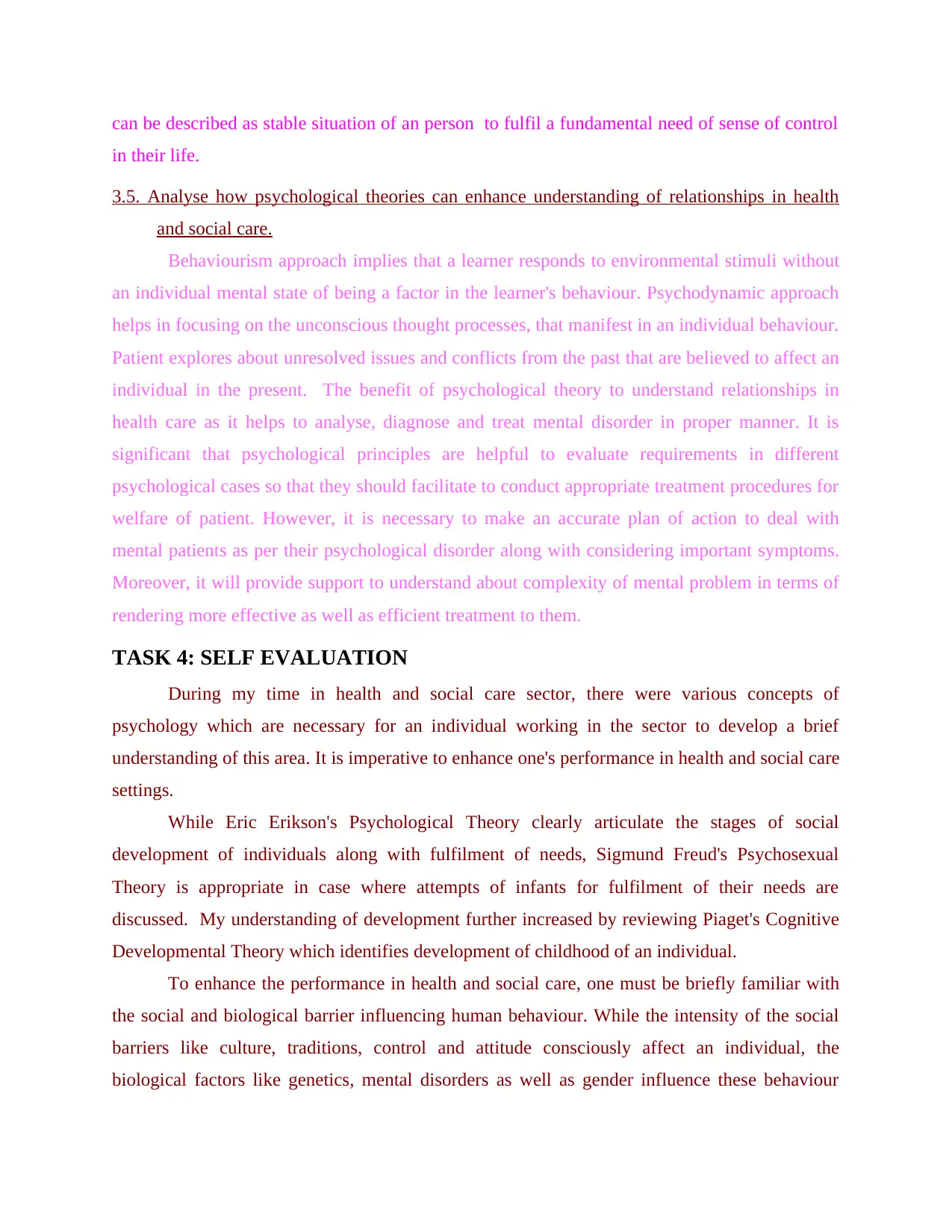
can be described as stable situation of an person to fulfil a fundamental need of sense of control
in their life.
3.5. Analyse how psychological theories can enhance understanding of relationships in health
and social care.
Behaviourism approach implies that a learner responds to environmental stimuli without
an individual mental state of being a factor in the learner's behaviour. Psychodynamic approach
helps in focusing on the unconscious thought processes, that manifest in an individual behaviour.
Patient explores about unresolved issues and conflicts from the past that are believed to affect an
individual in the present. The benefit of psychological theory to understand relationships in
health care as it helps to analyse, diagnose and treat mental disorder in proper manner. It is
significant that psychological principles are helpful to evaluate requirements in different
psychological cases so that they should facilitate to conduct appropriate treatment procedures for
welfare of patient. However, it is necessary to make an accurate plan of action to deal with
mental patients as per their psychological disorder along with considering important symptoms.
Moreover, it will provide support to understand about complexity of mental problem in terms of
rendering more effective as well as efficient treatment to them.
TASK 4: SELF EVALUATION
During my time in health and social care sector, there were various concepts of
psychology which are necessary for an individual working in the sector to develop a brief
understanding of this area. It is imperative to enhance one's performance in health and social care
settings.
While Eric Erikson's Psychological Theory clearly articulate the stages of social
development of individuals along with fulfilment of needs, Sigmund Freud's Psychosexual
Theory is appropriate in case where attempts of infants for fulfilment of their needs are
discussed. My understanding of development further increased by reviewing Piaget's Cognitive
Developmental Theory which identifies development of childhood of an individual.
To enhance the performance in health and social care, one must be briefly familiar with
the social and biological barrier influencing human behaviour. While the intensity of the social
barriers like culture, traditions, control and attitude consciously affect an individual, the
biological factors like genetics, mental disorders as well as gender influence these behaviour
in their life.
3.5. Analyse how psychological theories can enhance understanding of relationships in health
and social care.
Behaviourism approach implies that a learner responds to environmental stimuli without
an individual mental state of being a factor in the learner's behaviour. Psychodynamic approach
helps in focusing on the unconscious thought processes, that manifest in an individual behaviour.
Patient explores about unresolved issues and conflicts from the past that are believed to affect an
individual in the present. The benefit of psychological theory to understand relationships in
health care as it helps to analyse, diagnose and treat mental disorder in proper manner. It is
significant that psychological principles are helpful to evaluate requirements in different
psychological cases so that they should facilitate to conduct appropriate treatment procedures for
welfare of patient. However, it is necessary to make an accurate plan of action to deal with
mental patients as per their psychological disorder along with considering important symptoms.
Moreover, it will provide support to understand about complexity of mental problem in terms of
rendering more effective as well as efficient treatment to them.
TASK 4: SELF EVALUATION
During my time in health and social care sector, there were various concepts of
psychology which are necessary for an individual working in the sector to develop a brief
understanding of this area. It is imperative to enhance one's performance in health and social care
settings.
While Eric Erikson's Psychological Theory clearly articulate the stages of social
development of individuals along with fulfilment of needs, Sigmund Freud's Psychosexual
Theory is appropriate in case where attempts of infants for fulfilment of their needs are
discussed. My understanding of development further increased by reviewing Piaget's Cognitive
Developmental Theory which identifies development of childhood of an individual.
To enhance the performance in health and social care, one must be briefly familiar with
the social and biological barrier influencing human behaviour. While the intensity of the social
barriers like culture, traditions, control and attitude consciously affect an individual, the
biological factors like genetics, mental disorders as well as gender influence these behaviour
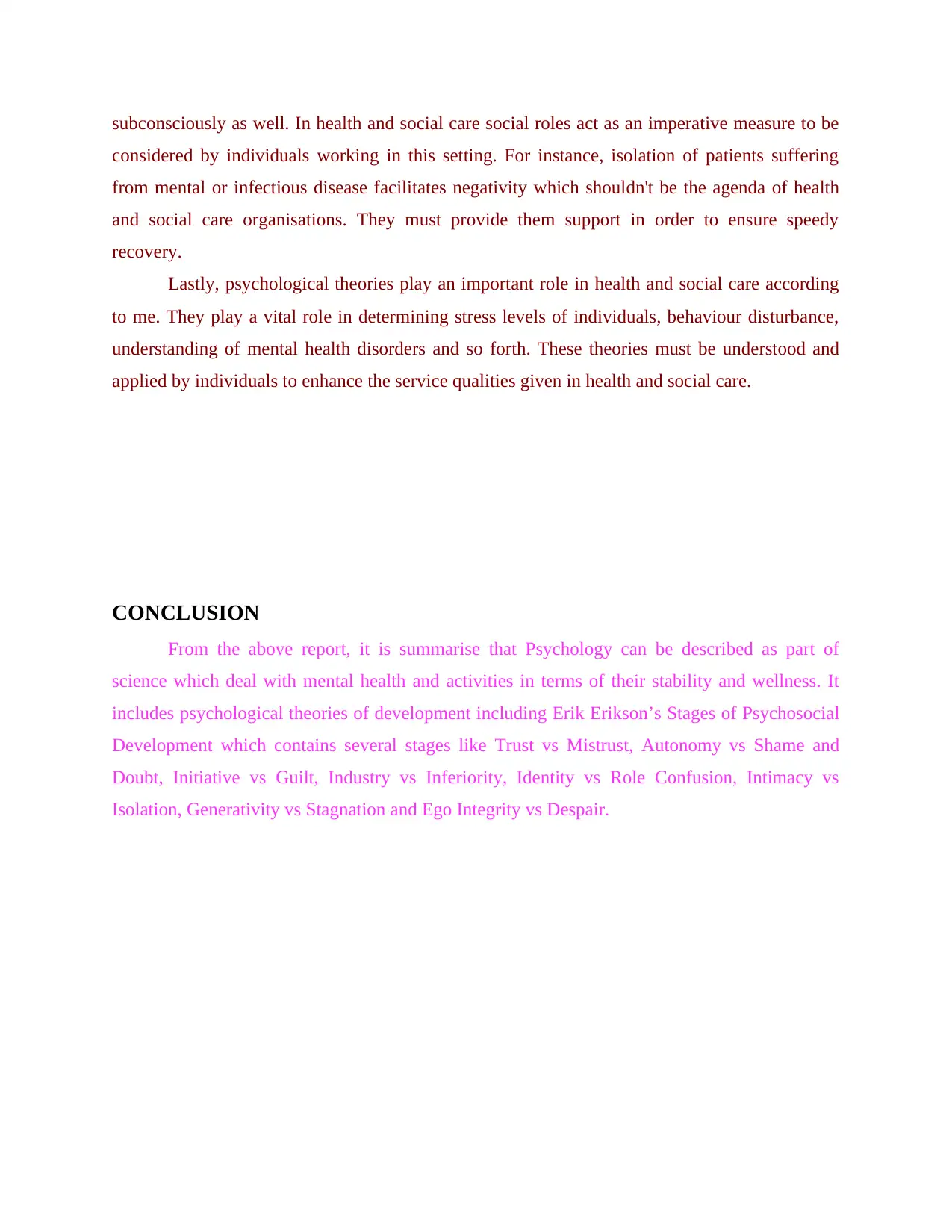
subconsciously as well. In health and social care social roles act as an imperative measure to be
considered by individuals working in this setting. For instance, isolation of patients suffering
from mental or infectious disease facilitates negativity which shouldn't be the agenda of health
and social care organisations. They must provide them support in order to ensure speedy
recovery.
Lastly, psychological theories play an important role in health and social care according
to me. They play a vital role in determining stress levels of individuals, behaviour disturbance,
understanding of mental health disorders and so forth. These theories must be understood and
applied by individuals to enhance the service qualities given in health and social care.
CONCLUSION
From the above report, it is summarise that Psychology can be described as part of
science which deal with mental health and activities in terms of their stability and wellness. It
includes psychological theories of development including Erik Erikson’s Stages of Psychosocial
Development which contains several stages like Trust vs Mistrust, Autonomy vs Shame and
Doubt, Initiative vs Guilt, Industry vs Inferiority, Identity vs Role Confusion, Intimacy vs
Isolation, Generativity vs Stagnation and Ego Integrity vs Despair.
considered by individuals working in this setting. For instance, isolation of patients suffering
from mental or infectious disease facilitates negativity which shouldn't be the agenda of health
and social care organisations. They must provide them support in order to ensure speedy
recovery.
Lastly, psychological theories play an important role in health and social care according
to me. They play a vital role in determining stress levels of individuals, behaviour disturbance,
understanding of mental health disorders and so forth. These theories must be understood and
applied by individuals to enhance the service qualities given in health and social care.
CONCLUSION
From the above report, it is summarise that Psychology can be described as part of
science which deal with mental health and activities in terms of their stability and wellness. It
includes psychological theories of development including Erik Erikson’s Stages of Psychosocial
Development which contains several stages like Trust vs Mistrust, Autonomy vs Shame and
Doubt, Initiative vs Guilt, Industry vs Inferiority, Identity vs Role Confusion, Intimacy vs
Isolation, Generativity vs Stagnation and Ego Integrity vs Despair.
⊘ This is a preview!⊘
Do you want full access?
Subscribe today to unlock all pages.

Trusted by 1+ million students worldwide
1 out of 13
Related Documents
Your All-in-One AI-Powered Toolkit for Academic Success.
+13062052269
info@desklib.com
Available 24*7 on WhatsApp / Email
![[object Object]](/_next/static/media/star-bottom.7253800d.svg)
Unlock your academic potential
Copyright © 2020–2026 A2Z Services. All Rights Reserved. Developed and managed by ZUCOL.





